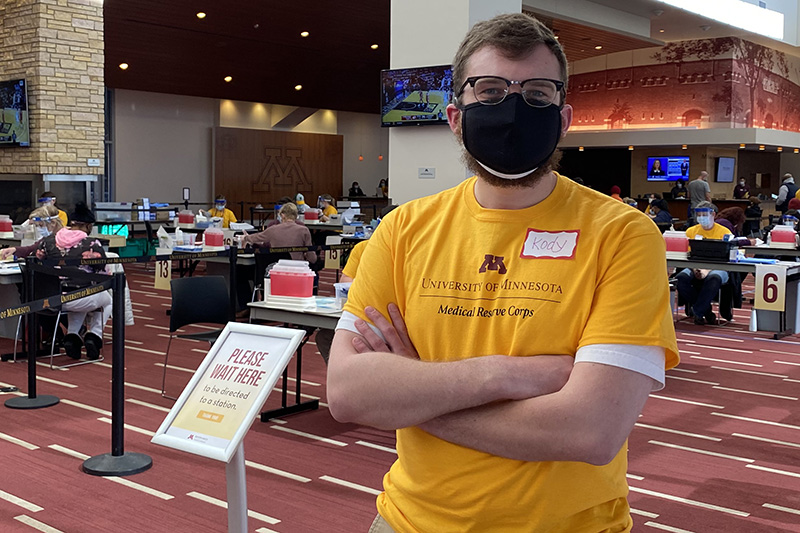
Defining moments: Putting policy to work to support, advocate for disability community
Kody Olson (’18 global resources systems, agriculture and society), policy advisor for the Minnesota Council on Disability, has been working with the Minnesota State Emergency Operations Center throughout the COVID-19 pandemic and beyond. Active in student government during his time at Iowa State, it comes as no surprise that this recent grad jumped into policy work immediately after graduation.
Olson’s efforts have made him a go-to person for the disability community in Minnesota.
“One night I got a call at 10:30 from a mother and daughter had just lost power to their home and rely on powered machines for their health,” Olson says. “Their lives were at risk, and so I worked with the City of Minneapolis to immediately get a power generator for that family.”
Formerly the public policy director for the Minnesota Council on Disability, Olson (who is Deaf with a cochlear implant) provided policy advice and advocacy to the Minnesota Governor, state legislature and state agencies on disability community issues.
“Kody has done incredible work to ensure our state works for all Minnesotans, including the disability community,” says Governor Tim Walz. “Throughout the pandemic, he worked to make sure that Minnesotans with disabilities were represented and had the resources, including testing and vaccines, that they needed to stay safe.”
Olson has stepped back from his director position in the Governor’s Office to focus on furthering his education in earning a master’s in public policy and public health at the University of Minnesota. He continues to support the Minnesota disability community as a disability policy advisor to the State Emergency Operations Center.
In addition to providing direct support to Minnesotans, he has played a vital role in developing legislation to support the unique needs of those with disabilities, such as a bill that would permit personal care assistants to provide transportation for COVID testing, treatment and vaccination.
Reflecting on his work, Olson spoke with Minnesota Public Radio earlier this year, explaining how people with disabilities often disproportionately suffer from the effects of the pandemic.
“We know that folks with intellectual and developmental disabilities have been disproportionately harmed by COVID-19. I would call it an assault on the disability community,” he says. “COVID-19 has disrupted the way that people have lived in their communities. It’s disrupted how they receive their homecare services and independent living services. Transportation barriers have a huge impact on the community. Fortunately, we have a strong coalition of public and private, state and local partners working to provide transportation, and meet the needs of Minnesotans with disabilities throughout the state.”
As a public health student, Olson also takes an active role in serving the health of Minnesotans by volunteering as a member of the University of Minnesota’s Medical Reserve Corps (MRC).
“The MRC is composed of University faculty and students, and we respond to a variety of emergencies in our community and around the country,” Olson says. “The program has been around for a while and has adapted to meet the emerging needs of the COVID-19 pandemic. For example, we have been supporting testing and vaccination clinics around the state. At the clinics, I assist with a number of non-medical tasks such as helping folks get registered for their appointment, on-site logistics, and monitoring patients after their shot.”
The intersection of race and disability is an important consideration, says Olson, and he’s committed to understanding and focusing his work on the unique challenges faced by people of color with disabilities. Olson recently found himself among an uprising for social justice as a resident of St. Paul.
“Between supporting the state’s emergency management response, getting calls from members of the disability community whose support services were impeded and feeling concern for my neighbors and community during the unrest, this year has been filled with defining moments for me both personally and for my community,” Olson says.
As he considers the experiences of the past year, he looks forward with hope that better understanding will lead to systemic change.
“I’m elated to see a country care about really important social justice issues, and it’s incredible to live in the place where that revolution started,” he says. “I live in a historically Black community, and it’s been amazing to see our neighbors come together to listen and learn from each other. As a white man I’ve done a lot of reflecting on my role in racism and how we can move forward together.”



